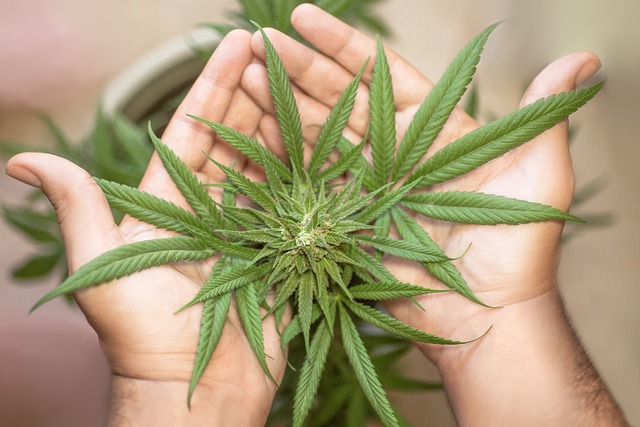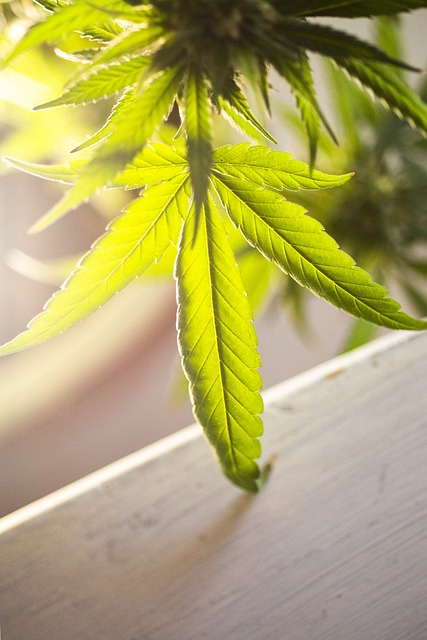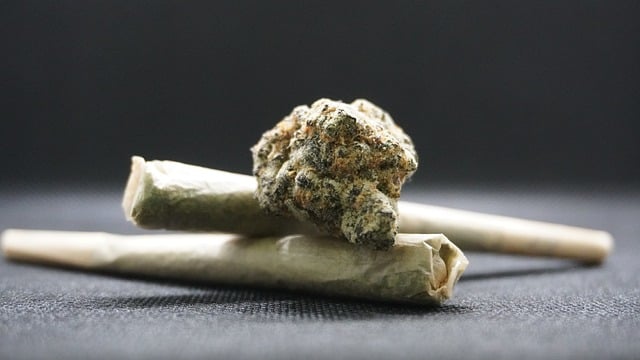2023 has seen a growing interest in THCA (Tetrahydrocannabinolic Acid), a non-psychoactive cannabinoid with potential health benefits that's gaining traction for conditions like arthritis, multiple sclerosis, and nausea from chemotherapy. While the U.S. legal landscape is evolving, with some states fully legalizing THCA alongside medical and recreational cannabis, others have more restrictive policies. The 2018 Farm Bill allows hemp-derived cannabinoids like THCA with less than 0.3% delta-9-THC, but state laws vary widely, necessitating consumers to stay informed about the legal status of THCA within their jurisdiction. Understanding the distinction between THCA and its psychoactive form THC is key, as the legal status can depend on how it's processed. Consumers should always consult authoritative sources and healthcare professionals before using THCA, given the complex nature of its legality across the USA.
exploration into the burgeoning world of cannabinoids unveils the rising prominence of THCA flower, a non-psychoactive form of cannabis with a plethora of potential benefits. As this natural compound gains recognition for its therapeutic properties and legal status becomes clearer in various USA states, understanding its nuances is crucial for both consumers and policymakers. This article delves into the multifaceted aspects of THCA flower, from its legality and sourcing to its effects, storage, and future prospects within the evolving landscape of American cannabis policy. Join us as we navigate the complexities surrounding this promising cannabinoid and its role in health and well-being, all while adhering to the legal framework that shapes its availability across the nation.
- The Rise of THCA Flower in the Legal Landscape of the USA
- Understanding THCA: Potential Benefits and Effects
- Navigating THCA Legality Across Different States
The Rise of THCA Flower in the Legal Landscape of the USA

As the legal landscape of the United States continues to evolve, THCA (Tetrahydrocannabinolic Acid) flower has emerged as a significant player in the cannabis market. Initially, cannabis legislation changes primarily focused on CBD (cannabidiol) and THC (tetrahydrocannabinol), the latter of which is the psychoactive component found in mature cannabis plants. However, with a growing body of research highlighting the potential benefits of THCA, a non-psychoactive precursor to THC, many states have begun to legalize the sale and possession of THCA flowers. These flowers are prized for their high concentrations of THCA, which offer therapeutic properties without the intoxicating effects associated with THC. As of this writing, several U.S. states have legalized the use of THCA-rich cannabis products, recognizing the substance’s potential in various health and wellness applications. This shift towards THCA legality reflects a broader trend in the United States towards more nuanced cannabinoid regulations, with policymakers increasingly distinguishing between different types of cannabis compounds and their effects. As such, consumers in these states have access to THCA flowers, which they can use for their own well-being or as an ingredient in a variety of products, from edibles to topicals, marking a new era in the evolution of cannabis policy and consumption within the U.S. legal framework. The popularity of THCA flower is likely to continue growing as more research is conducted and its benefits become better understood by both consumers and regulators. States that have legalized THCA are at the forefront of this green rush, setting a precedent for the potential future legislation of other cannabinoids within the broader cannabis spectrum.
Understanding THCA: Potential Benefits and Effects

THCA, or Tetrahydrocannabinolic Acid, is a non-psychoactive cannabinoid found naturally in raw cannabis plants and is a precursor to THC (Tetrahydrocannabinol), the most well-known cannabinoid with psychoactive properties. As of my knowledge cutoff in 2023, THCA’s legal status varies by state within the United States, with some states fully legalizing both medical and recreational cannabis, including its derivatives, while others have more restrictive laws.
Interest in THCA has grown due to anecdotal reports and emerging scientific research suggesting a range of potential health benefits without the psychoactive effects associated with THC. Advocates claim that THCA may offer anti-inflammatory, neuroprotective, and analgesic effects, which could make it beneficial for conditions like arthritis, multiple sclerosis, and neuropathic pain. Preliminary studies also indicate that THCA might have antiemetic properties, making it a potential treatment option for nausea and vomiting caused by chemotherapy. Consumers interested in the potential health benefits of THCA should be aware of their local laws regarding cannabis products, as possession and use are subject to state-specific regulations and may not be federally legal across all USA states. It is crucial for individuals to consult with healthcare professionals before incorporating THCA into their wellness routines.
Navigating THCA Legality Across Different States

The legality of THCA, or tetrahydrocannabinolic acid, a non-psychoactive precursor to THC found in raw cannabis plants, varies across different states in the USA. It’s crucial for individuals interested in the legal status of THCA to understand that federal and state laws often diverge significantly in this area. As of the knowledge cutoff date, the 2018 Farm Bill legalized hemp-derived products, including cannabinoids like THCA, containing less than 0.3% delta-9-THC on a dry weight basis at the federal level. However, state regulations can be more restrictive or may require specific licensing and adherence to state-specific guidelines to legally possess or use THCA products.
For instance, some states have fully legalized both medical and recreational cannabis, which includes THCA, while others have legalized only CBD with less than 0.3% THC or have very limited medical cannabis programs. It’s imperative for consumers to consult the most current state laws and regulations before purchasing or using THCA products, as these laws are subject to change and can be complex. Additionally, because THCA must undergo decarboxylation to become psychoactive THC, the legal distinctions between THCA and THC can be nuanced. Therefore, understanding the precise language of state statutes and local ordinances is essential for compliance with THCA laws in the USA states. Always verify the latest regulations from authoritative sources within each jurisdiction to navigate the legality of THCA effectively.
navigate the complexities of THCA legality across the United States, it’s clear that this non-psychoactive cannabinoid holds promise for various wellness applications. As the legal landscape evolves, consumers and medical professionals alike are increasingly turning to THCA flower as a natural alternative for its potential therapeutic properties. The rise of THCA within the legal confines of various USA states underscores the growing interest in this burgeoning category of cannabinoids. For those intrigued by the benefits of THCA and seeking compliance with state laws, understanding the nuances of its legality becomes paramount. As the conversation around THCA continues to expand, so too does the availability and variety of these products, offering a new horizon in the realm of cannabis wellness.
